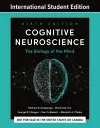
Cognitive Neuroscience
5 authors - Set / collection
£46.79 was £51.99
Michael Gazzaniga is the director of the SAGE Center for the Study of Mind at the University of California, Santa Barbara. He received his PhD from the California Institute of Technology, where he worked with Roger Sperry and had primary responsibility for initiating human split-brain research. He has established Centers for Cognitive Neuroscience at Cornell Medical School; the University of California, Davis; and Dartmouth College. He is founder of the Cognitive Neuroscience Institute and founding editor of the Journal of Cognitive Neuroscience. He was a member of the President's Council on Bioethics from 2001 to 2009. He is a member of the American Academy of Arts and Science, the Institute of Medicine, and the National Academy of Sciences. Richard B. Ivry is Professor of Psychology and Neuroscience at the University of California, Berkeley. He received his Ph.D. from the University of Oregon. His research focuses on the relationship of cognition and action, using the many methods of cognitive neuroscience. Dr. Ivry is a senior editor for the Journal of Cognitive Neuroscience and serves on the editorial boards of a number of other journals. Among his many honors, Dr. Ivry received the Troland Research Award from the National Academy of Sciences in 1997, and was elected a fellow of the Society of Experimental Psychologists in 2003 and the Association for Psychological Science in 2006. George R. Mangun is Professor of Psychology and Neurology in the Center for Mind and Brain at the University of California, Davis. He received his Ph.D. from the University of California, San Diego. He was the founding director of the Center for Mind and Brain, and also of the Center for Cognitive Neuroscience at Duke University. In 1992, with Michael S. Gazzaniga and others, he founded the Cognitive Neuroscience Society. Dr. Mangun serves as an associate editor for the Journal of Cognitive Neuroscience, and is Editor-in-Chief of the series The Neuroscience of Attention, published by Oxford University Press. He uses cognitive neuroscience tools in the study of brain attention mechanisms. He is a fellow of the Association for Psychological Science, and the American Association for the Advancement of Science.